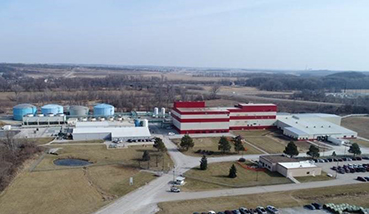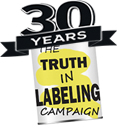LABEL LIES
Basic Facts (things the "glutes" don't want you to know)
This is How the "MSG is Safe" Game is Played
Propaganda
 Six Big Fat Lies About MSG
Six Big Fat Lies About MSG
The addition of monosodium glutamate and hydrolyzed protein products to our food supply has deep roots. The glutamate industry wields tremendous influence, and has untold amounts of money at stake in keeping the MSG in processed foods flowing freely – unregulated and unlabeled.
The MSG-is-safe propaganda machine is revved up and in full throttle. You’re apt to come across its misinformation/lies online, in print, or on TV in what appear to be “legit” articles, and in cutesy video presentations that pop up on Facebook. All that propaganda – that hype -- is constructed on six falsehoods, and once you know what they are, you are less likely to be conned/fooled/misled.
Falsehood #1: The glutamate contained in MSG is identical to the glutamate in the human body.
Actually: The glutamate in the human body is L-glutamate. L-glutamate, only. The glutamate of any manufactured glutamate (found in monosodium glutamate and pea protein isolate, for example) is made up of both L-glutamate and D-glutamate.Falsehood #2: MSG is very well researched and found to be safe.
Actually: Independent researchers have found L-glutamate to produce brain damage, endocrine disorders, and observable adverse reactions like migraine headache, hives, and seizures.Those studies that claim to have demonstrated monosodium glutamate safety have been rigged to fail to produce evidence of toxicity.
Claims that “authoritative” bodies or “well respected international agencies” have found MSG to be a harmless food additive are false. Neither independent scientists nor independent regulators have deemed monosodium glutamate safe. FDA studies, which were actually reviews, have always been staffed by persons with ties to the glutamate industry.
The regulators and/or authoritative bodies cited by the glutamate industry did no research of their own, but were given copies of FDA opinions on MSG safety or were provided review information by Ajinomoto, its not-for-profit corporations, and/or its agents — the International Food Information Council (IFIC) and the International Life Sciences Institute (ILSI), for example. And the vast body of published research demonstrating monosodium glutamate toxicity was not shown to them.
Falsehood #3: It must be safe since the FDA has said so.
Actually: The FDA relies on industry to determine what products are “safe.” Only when products are undeniably toxic, and claimed so by industry, or are not produced by big-food or big-pharma, will the FDA deem them unsafe.The FDA does not order drug recalls, regardless of evidence of toxicity unless directed to do so by big-food or big-pharma. The FDA does no recalls on food or other non-drug items. When things get hot, so to speak, the FDA orchestrates a voluntary recall to be made by the manufacturer.
Falsehood #4: MSG has been used for over a century without adverse reactions.
Actually: The statement that MSG has been used for over a century without adverse reactions is a bold-faced lie. Since 1968, there have been copious reports of brain damage, endocrine disorders, and adverse reactions following ingestion of MSG; and the glutamate cascade has been implicated in such disease conditions as addiction, stroke, epilepsy, degenerative disorders (Alzheimer's disease, ALS, and Parkinson's disease), brain trauma, neuropathic pain, schizophrenia, anxiety, and depression.Falsehood #5: MSG is naturally made, similar to yogurt, vinegar and wine.
Actually: MSG is manufactured using genetically modified bacteria that excrete glutamic acid through their cell walls. The only similarity to yogurt, vinegar, and wine is that their production includes fermentation.Falsehood #6: Monosodium glutamate occurs naturally in food.
Actually: MSG is manufactured using genetically modified bacteria that excrete glutamic acid through their cell walls. In the United States, monosodium glutamate is produced in Ajinomoto’s plant in Eddyville, Iowa.

The Ajinomoto plant in Eddyville, Iowa
https://iowaworksott.wordpress.com/2017/07/14/featured-employer-ajinomoto/ accessed 12/1/2018

